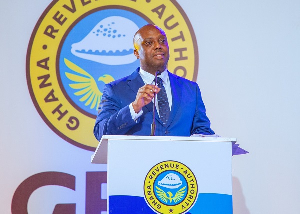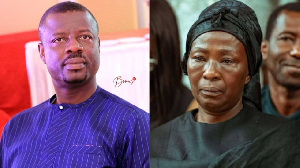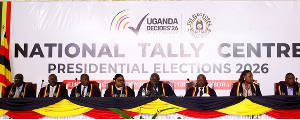You remember the Sahara oil agreement, the Police vehicles matter, the work on the castle and the President’s private residence, the talk about the privatization of water, (or private participation, as the case may be) and the aborted procurement of a loan from a body called the International Financial Consortium (IFC), different from the World Bank-affiliated International Finance Corporation.
In all these cases, the Government caught a lot of flak from the Minority National Democratic Congress, sections of the media, groups and individuals.
In the case of the president’s private residence the security of which had to be beefed up because he was staying there and commuting to work at the castle, somebody describing himself as a farmer surfaced from nowhere and paid the amount involved.
That gesture only fuelled the hullabaloo as The Ghana Palaver, the NDC and others queried the identity and financial standing of the donor.
The Government backed down on the IFC loan following the heavy dose of criticism. However, it forged ahead with the Sahara oil contract and the procurement of the vehicles for the Police.
The intended privatization or private participation in the supply of water also met with severe opposition. In the latest talk about the matter, criticism has centred on reported IMF-World Bank proposals deemed not to be in the interest of the country. The matter is still hanging.
If the Government thought that it had weathered the storm, it sailed straight into another tidal wave over the intended divestiture of Government’s remaining shares in the Ghana Commercial Bank.
Wave after wave of criticism pounded the Government until it announced a suspension of the divestiture. Will the suspension be temporary, as stated, or will the Government re-visit the issue with a view to off-loading its share in the Bank?
This Government is still under siege. There is the rumpus over exactly how much is the size of the arrears to be paid into the accounts of the Ghana Education Trust Fund (GETFUND).
The Government, the Minority NDC, the GETFUND Secretariat and the National Union of Ghana Students (NUGS) appear to quote different figures. It is hoped, in the interest of education in the country, that the issue will be resolved as soon as possible.
There is absolutely no need for any of the interested groups to make political capital out of its since a political score will not necessarily benefit education in the country.
Was there an attempt to plan a coup? Had there been other occasions when the present Government had had to nip attempts in the bud without informing the people for fear of causing needless alarm?
Was Lt-Colonel Larry Gbevlo-Lartey actually involved ? Has he been forced to retire in preference to his being dishonourably discharged from the Ghana Armed Forces ? What is the truth? These are questions that will not go away with the purported retirement of that officer.
The strike by the Polytechnic Teachers Association of Ghana ( POTAG) has come and gone. But that group is a volatile one, which explodes very easily. POTAG is quiet for now until the next strike.
The restive students in our universities are not just concerned about GETFUND arrears; they are also poised for war over university fees.
How much will be asked to pay eventually? If the fees go up, the rise will undoubtedly bring in its trail furious agitations for an increase in the loans given them. Are we going to witness street demonstrations by our students?
While the Government thinks of the tertiary institutions and their problems, there is the problem of the absorbed fees in the second cycle institutions.
As I write, Government is yet to pay the arrears. Yet, very soon, a new batch of senior secondary school students will be admitted to SSS One. Where will Government find the money? From the Consolidated Fund, GETFUND, SSNIT or where ? Mr. Kwadwo Baah-Wiredu, are you listening ?
The very active and very vocal Director-General of our Health Services, Professor A.B. Akosah, never loses an opportunity to tell the Government and the general public about the sorry state of the country’s health service.
Doctors are dying, they are leaving the country to seek greener pastures elsewhere, or they are leaving Government service for more lucrative pastures within the country.
Doctors’ additional duty hour allowances continue to be a problem. It has more often than not led to doctors, especially junior doctors, putting aside their much-cherished stethoscopes. Their Hippocratic oath is in danger of becoming a hypocritical oath as they agitate for better conditions of service.
If doctors are leaving, can our nurses be far away ? They are also leaving at an alarming rate.
Hospitals with the state-of-the-art equipment have no doctors at all or do not have the full complement of health personnel; doctors, nurses, pharmacists, laboratory technicians, etc.
Yet Government wants to do away with the admittedly obnoxious cash-and-carry policy currently in practice, in order to bring in a health insurance scheme.
The health insurance scheme is not an innovation being introduced by the Government. Certain areas in the country, as well as some religious groups, have introduced it. It is an idea whose time has come.
Everyone, it seems, wants to have the health insurance scheme. The snag, however, is the method Government wants to adopt to establish the scheme.
Workers, as individuals, the Trades Union Congress (TUC) as a group, and certain individuals are strongly opposed to the Government’s plan to start the scheme by taking two and half percent of worker’s Social Security contribution as seed money.
Government’s assurances, recently forcefully put by the Minister of Finance, Mr. Yaw Osafo-Maafo, that workers will not lose part of their benefits on retirement, have failed to convince the workers.
Indeed, at the time of writing of this article, the TUC leadership had announced as intention to stage nation-wide demonstrations to back their opposition to the Government’s proposal.
Meanwhile, Government is also seriously pushing the matter in Parliament. The Minority NDC members have boycotted the deliberations though they say they support the idea of a national health insurance scheme.
They say more time is needed to discuss the proposal and that there was no need to take the matter up together with the debate on extending the state of emergency in Dagbon.
Aha, Dagbon. The Dagbon tragedy is the irresistible train crashing into an immovable mountain. Dagbon is the festering, chronic sore that threatens to defy all attempts to cure it.
Dagbon is loaded with dynamite - political, intra-family, historical and personal.
Dagbon has exploded once and it can explode again. The tragedy of Dagbon is the tragedy of Ghana.
Here we are, dousing the flames of Sierra Leone, Cote D’Ivoire and Liberia and yet apparently unable to bring peace to this area.
Observers have spoken of the economic, political and administrative devastation wrought by the existence of a state of emergency and the imposition of a curfew that threatens to become a permanent feature of the place.
Certain individuals and groups are obviously fishing in the troubled waters of Dagbon for an advantage at the expense of the peace that should come to the area.
The solution does not lie in the hands of the politicians alone, whether of the majority or minority. It does not lie in the hands of the Government alone.
Ultimately, it is only when Andanis and Abudus, people of the same stock, make the super-human effort to bring about peace that peace can come to Dagbon.
It is not going to be easy to ask a people to forget real or perceived wrongs overnight. Personal and family honour may be at stake,
Fortunately, the advantage is also to be found in the fact that this conflict is not inter-hut intra-family conflict.
The solution, therefore, is with them. Let Dagbon know peace. Let the country know peace














